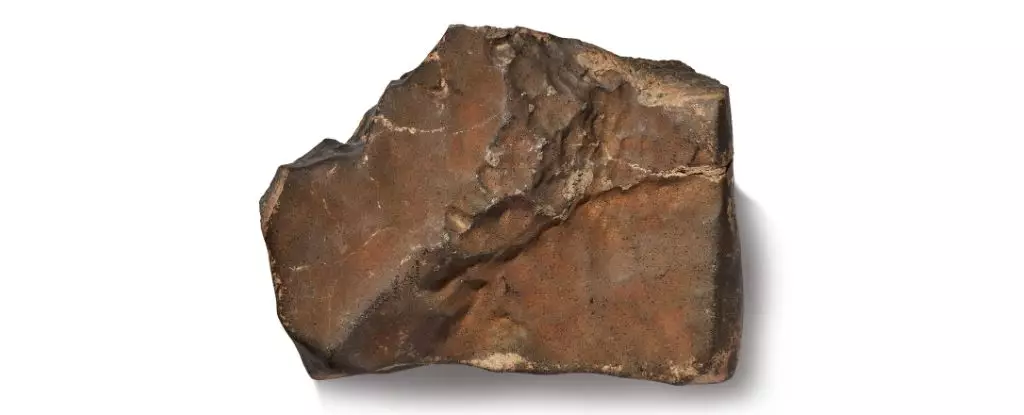The recent auction of a massive Martian meteorite at Sotheby’s in New York has ignited a fierce debate that transcends mere monetary value. Valued at a staggering $5.3 million, this 54-pound chunk of alien rock is not only the largest Martian meteorite ever found but also a symbol of both scientific wonder and the complex ownership issues tied to extraterrestrial materials. While its sale highlights the allure and commercialization of space-derived objects, it simultaneously raises profound questions about rightful ownership, legal sovereignty, and ethical stewardship of extraterrestrial heritage.
As the meteorite’s story unfolds—from its discovery in the vast Sahara Desert of Niger to its current status as a high-priced artifact—the underlying tension becomes evident. Niger’s government has signaled concern that the meteorite’s sale may be linked to illicit trafficking, prompting an immediate suspension of exports of meteorites and gemstones. This reaction underscores how nations perceive meteorites as more than scientific specimens; they are part of their cultural patrimony, deserving of protection and respectful stewardship.
The international community, including auction houses like Sotheby’s, faces a pivotal challenge: balancing the legal rights associated with ownership, the scientific importance of such specimens, and the ethical responsibility toward the country of origin. Sotheby’s insists that the meteorite was legally exported, but doubts persist. Critics, including American paleontologist Paul Sereno, argue that the meteorite was likely removed illegally, with the political and economic interests of various actors overshadowing scientific and cultural priorities. This tension reflects a broader struggle over who truly owns objects that originate on other planets yet land in Earth’s hands—whether the future belongs to global markets or to nations that host them.
Legal Frameworks and the Question of Ownership
Ownership laws regarding meteorites differ globally, creating a patchwork of regulations and ethical standards. In some countries, like the United States, meteorites found on private land are considered the property of the landowner, incentivizing private collecting. Conversely, Niger enforces laws that classify meteorites as part of its national cultural patrimony, emphasizing their significance as part of the country’s scientific and cultural heritage. Professionals like Gounelle and his father Max argue firmly that Niger has the legal right to control and protect such specimens, framing meteorites as invaluable cultural assets that should not be commodified without proper authorization.
This dichotomy reveals an underlying paradox: while meteorites are naturally occurring objects, their acquisition frequently involves complex legal and ethical considerations rooted in the country of origin. The illicit removal of specimens not only deprives the host nation of its cultural and scientific patrimony but also hampers global scientific progress. When a meteorite leaves its country of impact, questions of sovereignty and rightful ownership become unavoidable. The question is not merely about who physically possesses the object, but who has the moral right to it, especially given its immense scientific value.
The Scientific and Ethical Imperatives
Beyond legalities, a deeper debate revolves around the scientific importance of such extraterrestrial objects. The NWA 16788 meteorite is not just a rare Mars fragment; it is a crucial scientific resource. Its size and unique composition afford insights into Mars’ geological history, planetary evolution, and the broader processes that shape planetary bodies. Its scientific utility far outweighs its monetary value, making its preservation a matter of international importance.
However, commercial interests often threaten scientific integrity. When meteorites are sold at auction, their scientific potential can be compromised. Scientific integrity demands open access for researchers worldwide, fostering collaborative study that can unlock cosmic secrets. Commercialization risks turning these artifacts into luxury commodities, prioritizing profit over knowledge and heritage. From an ethical perspective, the scientific community should advocate for responsible stewardship that respects the origin nations and the scientific value of such samples.
Furthermore, the ethical question extends to respecting the natural heritage of celestial objects. Just as we respect Earth’s cultural landmarks, similar principles should apply to extraterrestrial materials. These meteorites are not just rocks; they are remnants of other worlds, holding the potential to expand humanity’s understanding of the universe. Therefore, respecting their origin and ensuring they are accessible for scientific research is a moral obligation for the international community.
Towards a Global Framework for Extraterrestrial Cultural Heritage
The controversy surrounding the Martian meteorite underscores an urgent need for international consensus. Existing legal frameworks are fragmented, leaving room for exploitation and ethical dilemmas. Establishing a global registry for extraterrestrial samples, akin to UNESCO’s protections for world heritage sites, could serve as a progressive step. Such a registry would facilitate transparency, ensure equitable access for scientists, and reinforce respect for national sovereignty.
Countries that host extraterrestrial objects must be empowered to protect their resources, fostering collaborations that respect legal statutes and scientific priorities. An international treaty—perhaps aligned with the Outer Space Treaty—could formalize the principles of ownership, scientific access, and cultural respect. This move would not sacrifice scientific progress but instead ensure it proceeds ethically and equitably.
In the long run, the quest should focus on creating an ethical framework that recognizes the shared universe as humanity’s collective heritage. Responsible stewardship, transparent legal processes, and global cooperation must guide our interactions with extraterrestrial materials. Whether through legislation or international agreements, it is incumbent upon us to treat these celestial gifts with the reverence, respect, and fairness they deserve, rather than allowing greed and legal ambiguities to tarnish their scientific and cultural significance.


Leave a Reply